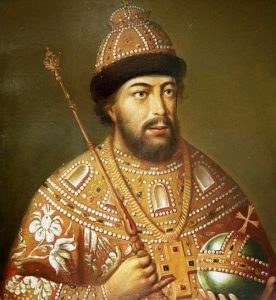(1598 – 1605)

Tsar Feodor Ivanovich did not leave a successor after him. All Moscow swore allegiance to his gentle wife Irina Fedorovna. But she did not want the authorities and retired to the Novodevichy Convent, where she was cut into a nun.
To select the sovereign was convened the Zemsky Sobor. Patriarch Job pointed the people to Boris, as the most worthy man to occupy the throne. Two times Godunov refused. Finally, after repeated requests of the clergy and the people, Boris agreed to be king.
On the 1st of September, on the New Year’s holiday, the royal wedding of Boris was performed. Taking the blessing from the patriarch Job, Boris said: “God knows that there will not be a beggar in my kingdom, I’ll share the last shirt with the people.”
In the first years of the reign, he attracted the benefits of immigrants to Siberia, summoned foreigners to Russia, sent young people to study abroad.
In Moscow, Boris gave poor people earnings, undertook several structures, for example, the Ivan the Great Bell Tower was built, which exceeded all the buildings in Russia.
He intended to open schools in Moscow where foreign languages would be taught, but the clergy did not approve of this plan.
Despite all his worries, he quickly lost his popular disposition due to his suspicion.
The victim of his suspicion was Bogdan Belsky, who was accused of malicious intent against the tsar and exiled.
The Romanov brothers were accused of intending to poison the tsar and imprisoned in distant places. The elder brother, Fedor Nikitich, was tonsured as a monk under the name of Filaret.
Generous alms during the famine and the cold weather did not calm the mob. The charge of the murder of Tsarevich Dmitry and the rumor about the appearance of an impostor shortened his life, and in April 1605 Boris Godunov unexpectedly died for all.